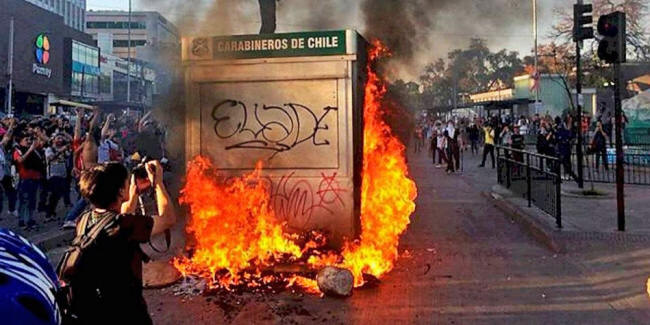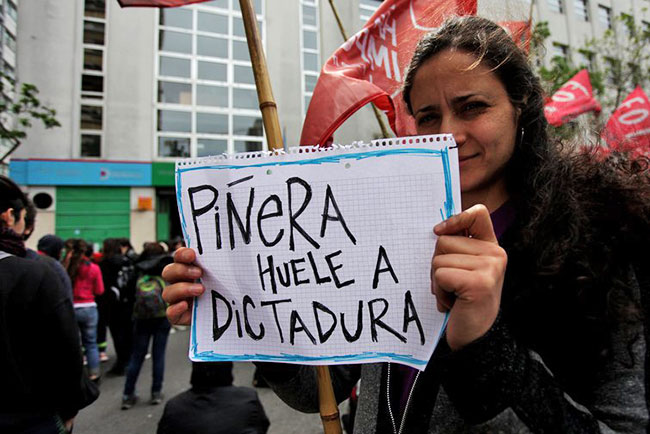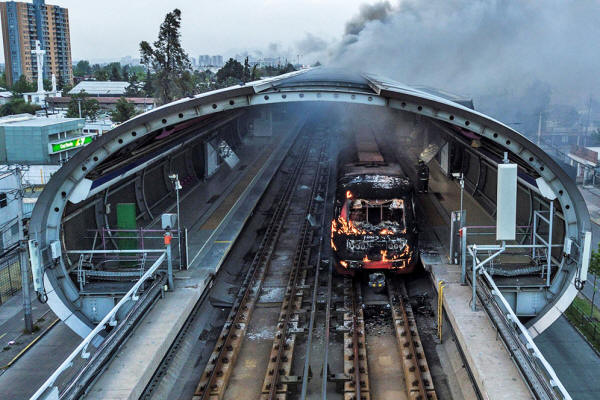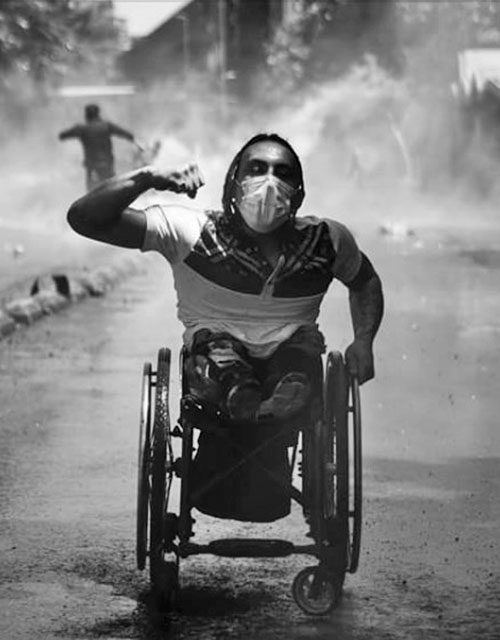|

by Yves Smith
October 24, 2019
from
NakedCapitalism Website

With 2019 shaping up to
be another 1848, it's hard to provide in-depth commentary on so many
protests. Nevertheless, Lambert hopes to provide a high-level piece
soon.
In the meantime, this post on Chile will hopefully fill in some of
the gaps as well as encourage readers who have insight to provide
additional comments and highlight any points that seem inaccurate or
incomplete.
It's also worth noting that Pinochet's Chicago School experiment ran
quickly into the ditch.
From ECONNED:
Chile has been
widely, and falsely, cited as a successful "free markets"
experiment.
Even though Chilean
dictator Augusto Pinochet's aggressive implementation of
reforms that were devised by followers of the
Chicago School of Economics
led to speculation and looting followed by a bust, it was touted
in the United States as a triumph.
Milton Friedman claimed in
1982 that Pinochet,
"has supported a
fully free-market economy as a matter of principle. Chile is
an economic miracle."
The State Department
deemed Chile to be,
"a casebook study
in sound economic management."
Those assertions do
not stand up to the most cursory examination. Even the temporary
gains scored by Chile relied on heavy-handed government
intervention….
The "Chicago
boys," a group of thirty Chileans who had become
followers of Friedman as students at the University of Chicago,
assumed control of most economic policy roles. In 1975, the
finance minister announced the new program: opening of trade,
deregulation, privatization, and deep cuts in public spending.
The economy initially appeared to respond well to these changes
as foreign money flowed in and inflation fell. But this seeming
prosperity was largely a speculative bubble and an export boom.
The newly liberalized
economy went heavily into debt, with the funds going mainly to
real estate, business acquisitions, and consumer spending rather
than productive investment.
Some state assets
were sold at huge discounts to insiders. For instance,
industrial combines, or grupos, acquired banks at a 40%
discount to book value, and then used them to provide loans to
the grupos to buy up manufacturers.
In 1979, when the government set a currency peg too high, it set
the stage for what Nobel Prize winner George Akerlof and
Stanford's Paul Romer call "looting" (we discuss this
syndrome in chapter 7).
Entrepreneurs, rather
than taking risk in the normal fashion, by gambling on success,
instead engage in bankruptcy fraud.
They borrow against
their companies and find ways to siphon funds to themselves and
affiliates, either by overpaying themselves, extracting too much
in dividends, or moving funds to related parties.
The bubble worsened as banks gave low-interest-rate foreign
currency loans, knowing full when the peso fell. But it
permitted them to use the proceeds to seize more assets at
preferential prices, thanks to artificially cheap borrowing and
the eventual subsidy of default.
And the export boom, the other engine of growth, was, contrary
to stateside propaganda, not the result of "free market" reforms
either. The Pinochet regime did not reverse the Allende land
reforms and return farms to their former owners.
Instead, it practiced
what amounted to industrial policy and gave the farms to
middle-class entrepreneurs, who built fruit and wine businesses
that became successful exporters. The other major export was
copper, which remained in government hands.
And even in this growth period, the gains were concentrated
among the wealthy.
Unemployment rose to
16% and the distribution of income became more regressive.
The Catholic Church's soup
kitchens became a vital stopgap.
The bust came in late 1981.
Banks, on the
verge of collapse thanks to dodgy loans, cut lending.
GDP contracted
sharply in 1982 and 1983.
Manufacturing
output fell by 28% and unemployment rose to 20%.
The neoliberal regime
suddenly resorted to Keynesian backpedaling to quell violent
protests. The state seized a majority of the banks and
implemented tougher banking laws.
Pinochet restored the
minimum wage, the rights of unions to bargain, and launched a
program to create 500,000 jobs.
Chile in Flames...
by Democracia Abierta
October
22, 2019
from
OpenDemocracy Website
Spanish version

Protesters in Buenos Aires
demonstrate their support with Chilean citizens
by denouncing police violence outside the Consulate.
PA Images: All Rights Reserved.
In a country
where the minimum wage
of 70% of the
population
barely reaches
$700 USD per month,
the news from
Chilean president Piñera last week
that the fare
for a metro ticket in Santiago would rise
from 800 Chilean
Pesos to 830 ($1.15 USD)
hit hard...
Only a week after the
huge mobilizations in Ecuador that successfully toppled the
controversial 'paquetazo', the financial plan imposed on the South
American nation by the International Monetary Fund (IMF),
another Latin American country has risen up against the economic
policies of its government.
In a country where the minimum wage of 70% of the population barely
reaches $700 USD per month, the news from Chilean president Piñera
last week that the fare for a metro ticket in Santiago would rise
from 800 Chilean Pesos to 830 ($1.15 USD) hit hard.
Chile, a nation with a
long history of neoliberalism, has been unable to eradicate poverty
with privatization policies, and it is estimated that around 36% of
the urban population live in extreme poverty.
The supposed "economic miracle" of Chile, which received its name
from American economist Milton Friedman, was a set of
liberalizing economic measures put in place during the dictatorship
of Pinochet, that imposed a free market in the country with the
support from
the United States.
This economic system,
that continues to be implemented today in Chile, has benefitted
the economic elites whilst creating
inequality and suffering for
the majority...
It's hardly surprising
that thanks to these neoliberal reforms promoted by Friedman, the
90s became the lost decade of Latin America.
Tired of the economic policies of the government, students and
citizens took to the streets of Chile to protest against the rise in
price of the metro ticket, but in reality this was just the tip
of the iceberg...
They are in fact
protesting against many other social issues such as high tariffs for
electricity and gas, low pensions, and a completely unaffordable
health and education system.
Protesters burnt metro
stations and public busses, and they looted supermarkets and public
buildings.

When Piñera spoke to the nation on Saturday evening to
declare the suspension of the increase in metro fare, it was already
too late to contain the fury that had been unleashed.
Students and young people
kept marching and demanding justice, whilst the government declared
a State of Emergency and sent the army to the streets.
That's why we explain to you everything you need to know about the
current protests in Chile and why this explosion of violence is so
important in the region.
Police Violence
and Democracy in Chile
It's not the first time that police use violence against their own
citizens in Chile, a country which has a long history of repression
of the mapuche indigenous communities when they rise up
against the lack of government recognition of their territorial
rights.
This display of
state violence against citizens
comes only 30
years after the dictatorship of Pinochet
murdered and
disappeared over 40,000 Chileans
during its reign
of terror...
In fact, police violence against
mapuche communities resulted in the
murder of community leader of only 24 years of age, Camilo
Catrillanca, last year when he was passing through an area in
which a police operation was being carried out and suddenly found
himself in the middle of a shoot out.
A stray bullet hit him in
the head and murdered him instantly...
The protests that began in Santiago but that have now extended
themselves across the country, have so far caused around 11 deaths,
mostly due to violence at the hands of the police and the Chilean
army.
This display of state
violence against citizens comes only 30 years after the dictatorship
of Pinochet murdered and disappeared over 40,000 Chileans
during its reign of terror.
What's more, according to
the National Institute for Human Rights in Chile, there have
been 84 firearm casualties and over 1420 people detained since the
protests began last week.
The reaction from Piñera has focused on only the violent acts of the
protesters, contributing to the criminalization of the right to
protest in the country.
"We have invoked the
Law of State Security, not against citizens, but against a
handful of delinquents that have destroyed property and dreams
with violence and wickedness".
He justified police
repression of protests by declaring that "democracy has a right to
defend itself", however, he also expressed his intentions to reach
agreements to improve the standard of living for the lower and
middle classes of Chile.
The actions of the police
and the army over the past week has shocked one of the most
democratic countries in the world, and the second most
democratic of Latin America according to
Freedom House.
Chile's high score for freedom of assembly and protest may be
affected by the actions of the state against its citizens this week,
which seriously affect the right to protest by criminalizing all
individuals involved.
Neoliberal
Malaise Throughout the Region
Economic malaise in Chile is part of a regional trend that follows
recent protests in Ecuador, that also began as a product of
frustration regarding the economic policies of president Lenín
Moreno.
Chileans, no
doubt empowered
by the recent
protests in Ecuador,
have also taken
to the streets
with the same
hopes...
Protests in Ecuador began as a reaction against a set of economic
policies referred to as the 'paquetazo', which were a series of
austerity measures imposed on the country by the International
Monetary Fund (IMF)
in order to cut public spending and repay debts faster.
This included,
the elimination of
fuel subsidies, public salary cuts, and huge holiday reductions
for public employees...
Civil society, but mainly
indigenous groups led by the
Confederation of Indigenous Nationalities of
Ecuador, took to the streets for weeks to protest against
the measures, until president Moreno declared that the 'paquetazo'
would no longer be implemented.
Chileans, no doubt empowered by the recent protests in Ecuador, have
also taken to the streets with the same hopes: that they will
achieve with their protests real change regarding how their
government manages the economy.
They also make it clear
that the poor management of the economy and imposition of neoliberal
policies have devastating and very human consequences for the most
disadvantaged of Latin America.
It's not only Chile and Ecuador that are facing massive citizen
unrest in the region.
Haití is also rising up
against the corrupt government of Jovenal Moïse and demanding
not only an explanation for what happened with millions of dollars
received from Venezuela, but also an end to neoliberal austerity
policies backed by their northern neighbor,
the US.
The
neoliberal model is in crisis, and
these protests have clearly demonstrated this.
Now, what happens in
Chile will depend on Piñera's 'capacity to negotiate' real
change, but if he fails at doing so, it will be impossible to
contain the rage that has already been unleashed in a country where
citizens are tired of injustice and inequality...

Source
|





